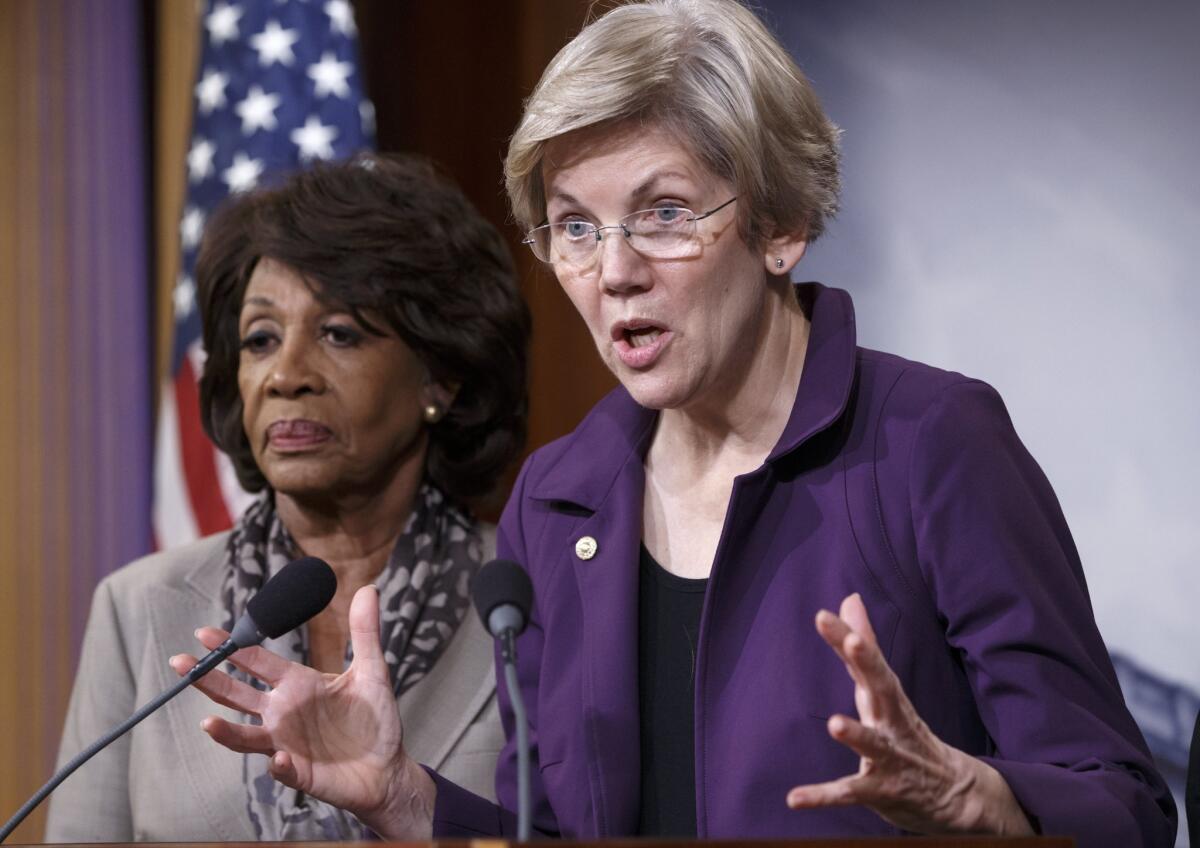Op-Ed: The real reason for Washington’s derivatives gift to banks

Sen. Elizabeth Warren (D-Mass.), front, and Rep. Maxine Waters (D-Calif.)voice their objections to a House-approved spending bill that includes a repeal of the Dodd-Frank divide between traditional banks and derivative trading, during a news conference at the Capitol in Washington.
As we embark on the seventh year since the historic collapse of the Lehman Bros. investment bank, it’s clear we haven’t fixed what broke the economy in 2008. Big banks still control Congress. Workers remain acutely vulnerable to another financial crisis. But we can’t blame only Wall Street for gaming the system. Wall Street does what America wants it to — lend American families money they can’t afford to pay back. Fixing Wall Street is easy. But then we would have to fix the problems that Wall Street’s machinations mask. And that’s hard.
This month, the lame-duck Congress gave Big Finance an early holiday gift. For four years, large financial firms have tried to eliminate part of the Dodd-Frank financial reform law. In signing the law in 2010, President Obama outlawed banks’ practice of taking money from regular folks’ bank accounts and using it to speculate on risky financial derivatives — financial instruments that allow their holders to vastly magnify their bets in bonds, oil and other markets, making those bets more dangerous.
Congress and Obama prohibited this practice because bank accounts enjoy taxpayer guarantees. If your bank fails, the FDIC, with government support, will give you the money you had in checking, savings or CDs (up to $250,000, which most of us don’t have). This reform didn’t end the problem of “too big to fail” banks, but it did make it a little less worse.
Now, Capitol Hill and the White House have given the banks what they want, repealing this prohibition in Congress’ spending bill for the next year. Citigroup, the country’s third-largest bank, wrote the bill that landed on the president’s desk Dec. 17. Once again, banks can use taxpayer money to gamble on derivatives.
This egregious example of crony capitalism sparked outrage among those tired of big-bank bailouts. Elizabeth Warren, the Democratic senator from Massachusetts, gave a powerful speech on the Senate floor condemning the repeal. “Democrats don’t like Wall Street bailouts. Republicans don’t like Wall Street bailouts,” she said. “Dodd-Frank isn’t perfect.” To Citigroup officials who might be listening, she said the 2010 law “should have broken you into pieces.”
Warren is right that everyone detests favors for Wall Street. You’d think any sentient Washington politician would be aware of that by now. The last presidential election was decided in large measure on which candidate seemed too close to Wall Street, so you’d also think that ambitious politicians wouldn’t want to look like they are doing Wall Street’s bidding.
Yet the provision passed, with bipartisan support. Cynics — and even people who aren’t so cynical — might say it’s just corruption as usual. The financial industry is Washington’s biggest donor.
If you’re feeling more charitable toward Congress, maybe you think fixing “too big to fail” is impossible, anyway. After all, a bank like Citigroup, with nearly $2 trillion in assets, is enormously complex and hard to regulate.
But making banks safer — and able to withstand a downturn without needing bailouts — is straightforward.
Banks get in trouble when they borrow too much money. And the derivatives that large banks want to trade under the FDIC’s protection are just a fancy way of borrowing money.
As Anat Admati and Martin Hellwig write in one of the best books about the financial crisis, “The Bankers’ New Clothes,” if you don’t want banks to get in so much trouble, don’t let them borrow so much. Restricting how much a bank can borrow is “simple and highly cost-effective,” write the authors, a Stanford economics professor and a researcher at a German think tank, respectively.
The real reason behind Washington’s intransigence is that if banks borrow less, they’ll lend less.
And the average American is dangerously dependent on debt. Since 2000, our household debt — mortgages, credit cards, car loans and the like — has soared 41% when adjusted for inflation. Since 1990, this debt has more than doubled. Americans owe 31/2 times as much as we did in 1981, when the Federal Reserve began keeping comparable statistics.
We don’t owe more because we became hugely irresponsible. For the average family, income and wealth have stagnated. The average male worker hasn’t increased his annual earnings — $39,903 — relative to inflation in three decades, Census data show. Women have fared better, partly because today’s women are better educated and more likely to work full time than women a generation ago. But the average woman’s earnings — $27,736 — are less than they were a decade ago.
As for savings? A new Pew Research study shows that the average American family has only $2,200 more in the bank or in other assets than it did in 1983, when adjusted for inflation.
Meanwhile, the cost of stuff you really need to get ahead in life — a house in a neighborhood with decent schools, healthcare, college for your kids — has soared far faster than inflation. To pay for it, people have borrowed. A lot. They could not have borrowed so much if the U.S. government did not stand behind such unsustainable debt.
As we start another New Year, let’s resolve to stop focusing on banks and start focusing on what’s really wrong with the economy. American workers are not earning enough. The fix is not likely to come from either party, as the three previous decades illustrate. But we cannot keep borrowing forever to paper over far deeper economic problems.
Nicole Gelinas is a contributing editor to the Manhattan Institute’s City Journal. Twitter: @nicolegelinas
Follow the Opinion section on Twitter @latimesopinion
More to Read
Start your day right
Sign up for Essential California for news, features and recommendations from the L.A. Times and beyond in your inbox six days a week.
You may occasionally receive promotional content from the Los Angeles Times.





